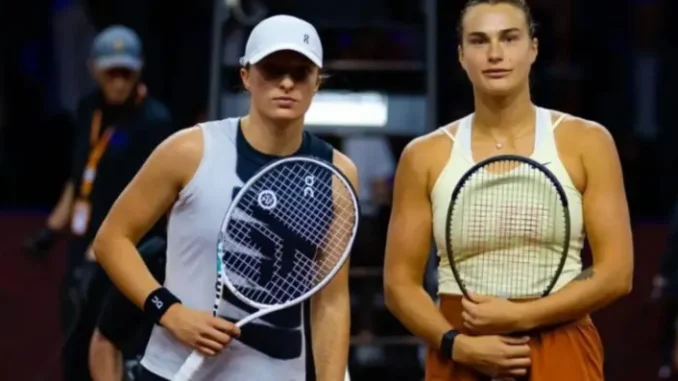
The dynamic landscape of women’s tennis, a realm where fierce rivalries coexist with mutual respect, recently witnessed a moment of candid exchange between two of its leading figures, Aryna Sabalenka and Iga Swiatek. The spark that ignited this particular conversation was Swiatek’s lighthearted suggestion that Sabalenka would make a good coach, a proposition met with a brutally honest and distinctly Sabalenka-esque response.
The context of this exchange lies in the ongoing narrative of the Sabalenka-Swiatek rivalry. These two players, who have consistently battled for supremacy on the court, have developed a complex relationship characterized by intense competition and a degree of camaraderie.1 Swiatek’s playful comment, therefore, was not merely a random observation, but rather a reflection of their shared experiences and mutual understanding.
Swiatek, known for her tactical acumen and analytical approach to the game, made the suggestion during a casual interview, perhaps recognizing Sabalenka’s own evolving understanding of the sport. She stated that “I think she would be a good coach, she has a very strong point of view.” This comment, delivered with a smile, was intended as a compliment, acknowledging Sabalenka’s growing maturity and strategic awareness.
However, Sabalenka’s response, delivered with her characteristic candor, was far from a conventional acceptance. She bluntly stated that “No, I would be a terrible coach. I don’t have the patience.” This reply, while delivered with a degree of humor, revealed a deeper truth about Sabalenka’s personality and her understanding of her own strengths and weaknesses.
The essence of Sabalenka’s response lies in her self-awareness. She recognizes that the qualities that make her a formidable competitor – her aggressive style, her unwavering focus, and her intense drive – may not translate effectively into a coaching role. The patience and empathy required to guide and mentor other players are qualities that she candidly admits she lacks.
“I’m too intense,” Sabalenka elaborated. “I want things done my way, and I don’t have the patience to explain things slowly. I would probably just yell at my players.”
This honesty is a hallmark of Sabalenka’s personality. She is known for her unfiltered communication and her willingness to express her opinions, even when they are unconventional or controversial. This authenticity has endeared her to many fans, who appreciate her genuine and unpretentious approach.
The exchange also highlights the contrasting personalities of Sabalenka and Swiatek. While Swiatek is often perceived as calm and composed, Sabalenka is known for her fiery temperament and her emotional displays on the court. This difference in personality is reflected in their respective approaches to the game and their perspectives on coaching.
The discussion also delves into the complexities of coaching in professional tennis. Coaching is not merely about imparting technical skills; it also involves providing emotional support, managing expectations, and fostering a positive team environment.2 These qualities require a level of patience, empathy, and communication skills that not all players possess.
Sabalenka’s candid admission that she lacks these qualities is a testament to her self-awareness and her respect for the coaching profession. She recognizes that coaching is a specialized skill that requires a unique set of attributes.
The exchange between Sabalenka and Swiatek has also sparked a broader discussion about the transition from player to coach. Many former players struggle to make this transition, finding it difficult to adapt to the different demands of the role.
The incident also highlights the level of respect between the two athletes. Even within a fierce competitive rivalry, there is room for playful banter and mutual recognition of each other’s strengths.
This interaction also shows how athletes are perceived by the public. Sabalenka is seen as a very strong player, with a powerful game.3 Swiatek sees that strength and believes it could be used for coaching. Sabalenka, however, knows that her own personality may not fit the role.
The discussion also highlights the pressure that high level athletes face. The constant need to be perfect, both on and off the court, can be very taxing. Sabalenka’s honest answer shows that even the top athletes have a clear understanding of their own strengths and weaknesses.
The exchange, while lighthearted, provides a glimpse into the personalities and perspectives of two of the leading figures in women’s tennis. It also serves as a reminder that even in the high-stakes world of professional sports, there is room for humor, honesty, and mutual respect.
Leave a Reply